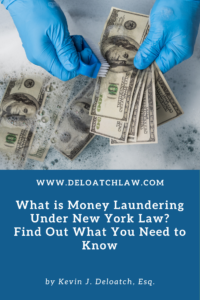If you or someone you know has been charged with or is the target of an investigation regarding money laundering under New York law, hiring an experienced criminal defense attorney is a necessity and not a luxury. Money laundering charges are serious legal matters that can have severe consequences for individuals and businesses, including incarceration and hefty fines. In short, being convicted of such a crime has serious long-lasting consequences.
Money laundering is also a federal crime. However, this blog discusses money laundering specifically under New York law.
What is Money Laundering Under New York Law?
Before delving into the specifics of money laundering under New York law, it is important to understand the general concept of money laundering. In broad strokes, money laundering is best described as the process of concealing the origins of illicitly obtained funds to give the appearance that the money came from a legitimate source. Because the sole purpose of money laundering is to disguise the illegal source of the money, it necessarily occurs in conjunction with other criminal activity (e.g., illegal drug sales, human trafficking, terrorism, counterfeiting rings…etc.).
Money laundering typically involves three distinct stages:
- Placement: Introducing “dirty” money into the financial system (e.g., through cash deposits).
- Layering: Creating complex transactions to obscure the money’s source (e.g., transferring funds between accounts).
- Integration: Using the laundered money for legal purposes (e.g., investing in real estate or businesses).
 There are various types of financial products and entities that have been used to commit money laundering (e.g., brokerage accounts, insurance products, and various types of cash businesses). More recently, cryptocurrencies have created another medium for money laundering.
There are various types of financial products and entities that have been used to commit money laundering (e.g., brokerage accounts, insurance products, and various types of cash businesses). More recently, cryptocurrencies have created another medium for money laundering.
Under New York law money laundering is defined by the various sections under New York Penal Law (NY PL) § 470. More specifically, NY PL § 470 includes the following subsections relating to money laundering:
- Money laundering in the fourth degree under NY PL § 470.05 (involves proceeds of criminal conduct);
- Money laundering in the third degree under NY PL § 470.10 (involves proceeds of the criminal sale of a controlled substance; total value of transaction(s) exceeds $10,000.00);
- Money laundering in the second degree under NY PL § 470.15 (involves proceeds of the criminal sale of a controlled substance; total value of transaction(s) exceeds $50,000.00);
- Money laundering in the first degree under NY PL § 470.20 (involves proceeds of the criminal sale of a controlled substance; total value of transaction(s) exceeds $500,000.00);
- Money laundering in support of terrorism in the fourth degree under NY PL § 470.21;
- Money laundering in support of terrorism in the third degree under NY PL § 470.22;
- Money laundering in support of terrorism in the second degree under NY PL § 470.23; and
- Money laundering in support of terrorism in the first degree under NY PL § 470.24.
Although each of the above-described money laundering sections has elements that are specific to that section, each section also has elements that are generally applicable. For example, which section of NY PL § 470 you will be charged under is determined by: 1) the specific criminal activity that is the source of the illegal funds (e.g., unspecified criminal conduct, criminal sale of a controlled substance, or terrorism), and/or 2) the amount of money involved in the transactions, both of which are defined by the specific statute section. However, the following elements apply to all of the sections under NY PL § 470:
- the person knows the property involved in the financial transaction comes from some form of criminal activity;
- the person conducting at least one financial transaction that in fact involves the proceeds from the criminal activity;
- the person knowing the transactions are designed to conceal the source, ownership or control of the proceeds of the criminal conduct;
- the person knowing that the transactions are designed to avoid any transaction reporting requirement.
It is also important to note that a person can be convicted of money laundering even when the money involved does not actually come from criminal activity. If the prosecutor can prove the person engaged in the transactions with the property with the intent to disguise the source after the property was represented as proceeds from criminal activity, including an act of terrorism, they can still be found guilty of money laundering.
Penalties for Money Laundering Under New York Law
 The penalties for money laundering under New York law are significant and vary depending on the facts and circumstances of each case. For example, the above-described money laundering sections are all felonies that range from a Class E felony, which carries a maximum term of incarceration of four (4) years, up to a Class B felony, which carries a maximum term of incarceration of twenty-five (25) years, as described in NY PL § 70.00.
The penalties for money laundering under New York law are significant and vary depending on the facts and circumstances of each case. For example, the above-described money laundering sections are all felonies that range from a Class E felony, which carries a maximum term of incarceration of four (4) years, up to a Class B felony, which carries a maximum term of incarceration of twenty-five (25) years, as described in NY PL § 70.00.
In addition to a substantial period of incarceration, a conviction can carry significant monetary fines under NY PL § 470.25. For instance, a person convicted under sections NY PL §§ 470.5 through 470.20 will be subject to a fine of two times the value of the monetary instruments which are the proceeds of the criminal activity.
Defense Strategies
As described above, navigating money laundering charges is quite intricate. When facing money laundering charges, a robust defense strategy is crucial. Such a defense necessarily includes the following:
- Challenging the Evidence: Scrutinizing the prosecution’s evidence. This includes examining financial records, transaction histories, and witness statements. Any inconsistencies or gaps can be used to weaken the case.
- Proving Lack of Intent: Money laundering charges require intent. Moreover, complex financial regulations and reporting requirements can lead to inadvertent violations. Thus, it is necessary to meticulously investigate whether the accused knowingly engaged in money laundering or if their actions were inadvertent.
- Negotiating Plea Deals: In some cases, negotiating a plea deal may be the best option. Thus, it is necessary to be able to properly assess the strength of the case to determine the most favorable outcome.
Have You Been Charged with Money Laundering?
If you or someone you know has been arrested for or are the potential target of a money laundering investigation, call the Law Office of Kevin J. Deloatch, Esq. at (646) 792-2156 for a free consultation. The results of all prosecutions are determined by the facts and circumstances of the specific case and the skill and experience of the defense attorney.
Defending money laundering cases requires a thorough understanding of the law, diligent investigation, and strategic planning. The Law Office of Kevin J. Deloatch, Esq. has an extensive criminal and securities law practice. With over 30 years of experience on Wall Street, the Law Office of Kevin J. Deloatch, Esq. understands the nuances of various types of financial transactions, products, and their associated legal intricacies.








